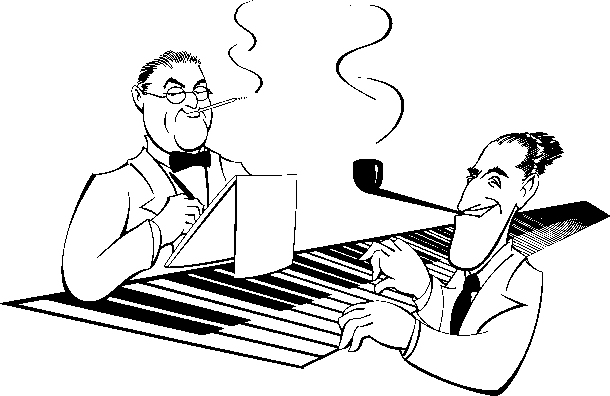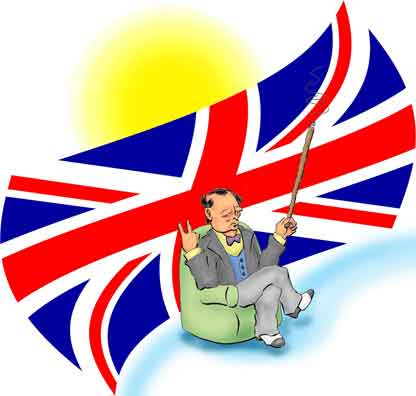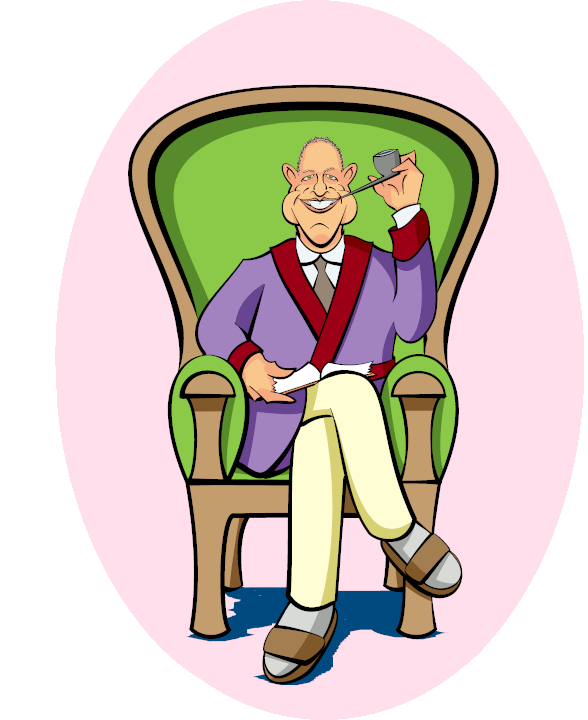You have to wonder how P. G. Wodehouse - it's pronounced WOOD-house - figured out that stories about a young man living on an inherited fortune and doing absolutely nothing with his life would make up some of the best selling books in the English language. But we see Bertie Wooster visiting his equally wealthy friends at their country estates and even making trips to America. He also whiled away considerable time playing golf (with better than a stroke per hole handicap) or spending his day at the Drones Club - after all, proper "gentlemen" belonged to a club - whose members were similarly disposed lagabouts who were absolutely wasting their lives.
Young Pelham Grenville Wodehouse - called "Plum" by his friends - wasn't from the same economic class as Bertie, but he was from the relatively upper crust. His dad was a magistrate - a judge - living in Hong Kong which was then a British colony. Plum lived there with his mum and dad for his first two years. Then - as was typical for such situations - he and his brother were sent back to England. There he was raised by his mom's parents although the day-to-day supervision was left to a nanny.
Plum later attended Dulwich College in London - not a college in the modern sense but a public boarding school for boys (which is what Americans would call a private school). Plum entered the school at age 12 and quickly showed his writing talent. Ultimately he won an essay contest where the prize was one guinea.
Plum left Dulwich in 1900 at age 18. The next step would have been to go "to University" as the British say always dropping the definite and indefinite articles. But his dad said he had met with some financial reverses and that Plum would have to go to work. So with his dad's considerable connections Plum got a job as a clerk in a bank.
It was a regimented job. There was no smoking while at work (in an era where almost all men smoked), no reading newspapers, and tea breaks had to be short. His first job was putting stamps on letters and taking them to the post office. From there he progressed to copying letters and entering numbers in the ledgers.
For his efforts Plum made £3 3s. 10d. a week. That was about $16 or around $575 in today's money. He found he had to economize on his meals and sometimes lunch was only a cup of tea and a roll with a pat of butter. His dad, though, did give him an extra £30 a year - not too bad since the weekly rent for a fully furnished house could be as low as £5.
Despite Plum's later statements that he was completely inept at the job, he was actually progressing up the ladder. But he was something of a night owl and often he'd wake up with little time to get to work. Because the workers could be docked pay if they were tardy, he might just pull his clothes over his pajamas before running in.
In fact the records show Plum was called to task a number of times for his tardiness. Clearly a banking life was not for him. So he decided he would be a writer. That wasn't quite such a crazy idea as it sounds.
The first decade of the 20th century has been called the Golden Age for Free Lance Writers. Beginning in the 1870's England had been taking steps to make sure all kids could go to school. So by the time Plum began writing there was a large and literate class of both men and women and kids.1 More magazines were being published than ever before, and advancements in engraving techniques made it possible to have illustrations that were near photographic quality. Color illustrations, although complicated to produce, were often used for the covers.
Footnote
The Elementary Education Act was enacted in 1870 mandated that school must be made available to children in England between the ages of 5 and 12. Today that's only at grade school level but even well into the 20th century it was common for kids to graduate from "grammar school" at age 14 and go to work. At that time grammar schools were grades 1 to 8 and high school was grades 9 to 12. Up through the 1930's high school was something that the rich kids went to.
But even relatively poor students could end up going to college if they wanted to make the effort. For instance, John A. Lomax, the famous folk song scholar, was born in 1867 and his family moved to Texas when he was still young. Living on a farm he was rarely able to attend school. Nevertheless he did learn enough so he could get admitted to a local land grant college. The curriculum provided him with what we would consider a modern high school education and with such fortification he was then able to pass the entrance examination to the University of Texas. He later attended Harvard University and obtained a masters degree.
Such rags to educational wealth stories were not limited to the United States. In the 1870's a poor British laborer named Joseph Wight - he was working at age six as a donkey driver in a rock quarry - began attending night classes at a tuition of 6d. per week. Ultimately he progressed to where he was able to pass the entrance examination to the University of Heidelberg in Germany. He earned a Ph. D. in Philology and became Professor of Philology at Oxford. Among his students was an undergraduate named John Ronald Reuel Tolkien.
But most of all there was no electronic entertainment - no movies, no television and not even radio. So for a good time people normally went out somewhere: to the theater, to concerts, to restaurants, to dances, to circuses, and to sports matches.
There was home entertainment, of course. A particularly popular activity was the dinner party. Mark Twain and his wife Olivia had people over for dinner about five times a week. This, though, wasn't for everyone and was really suited for the family that could afford cooks and butlers to do the actual work.
On the other hand, if you were home by yourself, options were limited. The truth is about the only passive entertainment was reading.
Or in Plum's case, it was writing. After a day at the bank Plum would go back to his "lodgings", a sitting room with a bedroom for which he paid 21 shillings a week (at that price - a whole pound - he may have had a private bathroom). There he began to write stories and articles and sending them to the editors. His first story was published in 1900, and at first he tried to be a serious writer. But humor was clearly his métier.
As is often the case in starting a new career, connections helped. One of his old teachers at Dulwich, William Thomas, had become a journalist and helped Plum get in touch with the Globe and Traveller. This was - as the editors themselves said - a literary magazine for the "educated classes". So Plum began making contributions.
Today we think of free lancing as a writer sitting at home and sending the submissions in. But at the Globe and Traveller the free lancers would show up at 9:00 in the morning and sit down at a desk and write their article. For his part Plum would usually turn out a bit of humorous prose or poetry. The editor would then either say yay or nay. If enough of the writer's submissions were accepted he might be offered a job on the staff.
Of course, a writer could submit stories to more than one periodical. In the first two years after leaving school, Plum contributed over 80 articles to various magazines and newspapers. This included a series called Pothunters which appeared in the Public School Magazine. Naturally the stories were drawn from his experience at Dulwich. Then when the magazine went out of business in 1902, Plum pulled the stories together and the publishers issued Pothunters as a single volume. With a book now under his belt, Plum was finally offered a job at the Globe and Traveller.
From then on Plum was a full time writer. Then in 1904 he decided to take some time off to see America. He figured he'd be gone less than a month, and then return to the grind. But in New York Plum met a literary agent, Seth Moyle, who found a publisher for two of his stories for $500. Back in London Plum had been getting only £10 - about $50 - per article. So he decided to stick around and sell his stories to the more generous American editors. He sent in his resignation to the Globe and Traveller and settled down in the Land of the Fee.
Once he was in America, Plum began writing about almost anything of interest. Boxing was the big sport in New York, and he also began writing for the theater, including lyrics for songs. One of his early musical collaborations was on The Beauty of Bath with music by none other than Jerome Kern (yes, the same Jerome Kern who wrote "Old Man River"). He also made contributions - although not always credited - to musicals penned by two brothers named Gershwin.

Two Brothers named Gershwin
Plum liked America and he liked Americans. Among other things he did while he was across the water was to marry Ethel Wayman, who was also from England and was twice widowed. They spent much of the next 20 years in America with periodic returns to England. Plum wrote for some of the most popular magazines - including Vanity Fair - and after a while - as we'll later see - he began to think of himself as more American than British. He even remained in America during World War I.
In 1915 his story "Extricating Young Gussie" appeared in The Saturday Evening Post. The protagonist was a young man of "idle means" named Bertram Wilberforce Wooster. Bertie - as he was known to his friends - goes to America at his Aunt Agatha's behest to extricate his cousin, Augustus Mannering-Phipps, from a love affair of which Aunt Agatha does not approve. Gussie had fallen for a vaudeville performer and has decided that he, too, will take to the stage.
Of course, it was unthinkable that any young man from a proper family would become intimate with one of the lower orders, much less aspire for such a disreputable profession himself. Bertie, always willing to help family members out of unfortunate spots and also not daring to be contrary to Aunt Agatha's wishes, heads to America with his valet, Jeeves. Ultimately all works out well, except from Aunt Agatha's perspective.
In "Extricating Young Gussie", Jeeves was a minor character and was not really part of the plot. It's the next story, "Leave it to Jeeves", where Jeeves is more in his famous persona as an intelligent and unflappable servant who gives advice to Bertie and his friends and relatives and sometimes helps Bertie himself out of a tight spot.
The basic premise of the stories - a savvy intelligent servant helping out an upper crust individual who seems incapable of pouring fine vintage wine out of his black leather gaiters with the instructions engraved in copperplate on the heel - traces its origins back to Ancient Greece. Of course the "servant" in the Greek comedy was always a slave. This smart slave/dumb master was a basic plot point of what is now called Athenian New Comedy. The most famous of the New Comedy playwrights is Menander who lived from about 342 BC to around 292.2
Footnote
It's worth mentioning that Menander's plays are also the precursor of one of the more lamentable of modern entertainments. That's the (ugh) sitcom. In addition to the clever slave who sets things aright, you had the love-sick male adolescent, the object of his affections in the form of a young and beautiful maiden, and the disapproving father whose refuses to countenance even platonic congress betwixt his daughter and the protagonist. And as true for our own sitcoms, the humor was light on action but heavy on dialog with the actors coming on stage and swapping barbs before exiting.
One little known aspect of Greek theater is how rarely the plays were staged and how limited was the audience. Plays were only performed during religious festivals a couple of times a year with the rituals lasting only a few days. The plays were also rather arduous for the attendees. They sat outdoors in open theaters - and it can get hot in Greece - as they watched back-to-back performances all day long. Women were not permitted to be actors and some historians think that even the audiences were exclusively men. It wasn't until the rise of Rome that theater was staged for entertainment, available at all times of the year, and the audience open to everyone regardless of gender.
None of Menander's 100 plus comedies survive in their entirety. Only Dyskolos (Δύσκολος, "The Grump") comes down to us relatively intact. However, Menander's legacy is long and a tally on a popular informational website lists the number of sitcoms ever produced at over 1500 - and rising.
With the Jeeves and Wooster books so popular it was inevitable that Hollywood would bring them to the silver screen. In 1936 Twentieth Century Fox released Thank You, Jeeves! starring Arthur Treacher3 as Jeeves and - get this - David Niven as Bertie.
Footnote
Yes, for those who remember the popular establishments, the British actor Arthur Treacher lent his name to Arthur Treacher's, the fish and chips restaurants.

Jeeves and Wooster
(Arthur and David)
Click to Zoom In and Out
As with many films based on literature, any resemblance between the film and the book was mainly in the title. Plum himself stated "They didn't use a word of my story, substituting another written by some studio hack." A second movie was released the next year and departed even more from the stories. In Step Lively, Jeeves, Bertie didn't even appear and Jeeves - always erudite and intelligent in the books - was written as a buffoonish fish out of water.
Plum himself wrote screenplays, often as collaborations and sometimes "polishing" the works of others. If nothing else the work provided a good income. But various events and individuals soured Plum on Hollywood and in the spring of 1924, he and Ethel decided to return to Europe.
Back home and now rich and famous, Plum's self-imposed workload was immense. He continued to - using a pardonable expression - "crank them out" including more Jeeves and Wooster stories. Although he had a number of residences, life in England was hectic and he and Ethel needed a refuge.
But not in England. France had a more laid back lifestyle than metropolitan London. Besides England tended to tax the heck out of successful writers (as another successful writer, Winston Spencer Churchill, would find out). So Plum decided it would be better for him and Ethel to settle in a spacious home in Le Touquet just across the Channel.

A Successful Writer
But the times were tense. The grandson of Maria Schicklgruber had tried to stage a coup of the Weimar Republic in 1922 and install a dictatorship in Germany. Although he failed and he spent 18 months in prison, he returned to the political scene by 1925 and based his political agenda on racism and bigotry. Amazingly in 1933 he managed to get appointed Chancellor of Germany even though he had never held any elected office.
Soon Schicklgruber - although he went by another name - was making noises about creating a Greater Germany which would include Austria and environs - environs which ranged from North Africa to Scandanavia. Also the leader of Russia - a former bank robber named Josef Dzhugashvili - was conducting a reorganization which became known as the Great Purge. Even in far away Asia, war was breaking out when Japan invaded China.
Germany began turning fantasy into reality. When a lone incendiary set fire to the German parliament building (the Reichstag), the constitution was suspended and dictatorial powers granted to the Chancellor. Austria was annexed in 1938 and the following year the army invaded Poland. Britain, having informed the German government what such action would mean, declared war. So when Germany invaded France in 1940, Plum found himself an enemy alien in occupied territory. He and Ethel were placed in an internment camp.
But Plum was also a world famous author. The camp commandant lent Plum a typewriter so he could continue to write and it's also clear that Plum was in what can be best be described as Potemkin Village confinement. He was soon transferred to Berlin where he was either placed under supervision or given free access to the city depending on who you believe and neither of which is mutually exclusive.
On June 28 and while he was in Berlin, Plum made the first of five radio broadcasts to America. The reasons why have been debated ever since. Certainly the topics were humorous, completely non-political, and one of the "broadcasts" was in fact an interview with the American CBS correspondent Harry Flannery. When Flannery had mentioned the broadcast might cause some trouble, Plum had responded, "We're not at war with Germany." Such a statement, as George Orwell later pointed out, suggests that by this time Plum considered himself essentially an American and America didn't go to war until December.
But Plum was indisputably and legally British. His fellow Britains, being subjected to daily bombing raids by the Luftwaffe where tens of thousands of civilians died, were both flabbergasted and angered at the broadcasts. Plum's books were yanked from the bookstores and he was denounced in Parliament.
In 1943 the Germans allowed Plum and Ethel to return to their home in Le Touque. Then in June 1944 the Allies landed on the Normandy beaches, and by August they were in Paris.
Plum and Ethel were arrested by the French authorities for suspicion of collaboration, although Ethel was soon released. Among the specific charges were that Plum didn't attempt to escape from the German Army when they invaded France, he entertained Germans in his home and at the Berlin hotels, he collaborated with the Germans in exchange for privileges and money, and he agreed to make the broadcasts in exchange for his release.
Plum was interrogated by MI5 Major Edward Cussen. Plum answered the questions as best he could and said that making the broadcasts was an incredible blunder. After four days of questioning - which Ethel found "tiresome" - the Major issued his report.
There was no evidence for intentional collaboration. But Major Cussen did mention that regardless of Plum's lack of intent, the broadcasts had been at least of some propaganda value for the Germans. Furthermore, having the most popular British author saying that he was doing well while in German captivity may indeed have assisted the German war effort. In the end, though, the British government decided to take no action.
Plum's own explanation was that he had been "duped" by the Germans. And far from being paid by the Germans and living in fancy hotels, he said he and Ethel lost everything and Ethel even had to sell her jewelry for them to survive. His motives in making the broadcast were simply to get word to his friends in America and England that he and Ethel were OK.
The public, though, was not mollified and Plum and his books remained persona non grata in England. But soon after the war George Orwell published an essay "In Defense of P. G. Wodehouse". He pointed out that Plum had always had a complete lack of political awareness and pointed out that the broadcasts had been made early in the war when there was still some sentiment for a negotiated peace. George also pointed out that the people who were still criticizing Plum were the very people who had been preaching appeasement only a year or so before the broadcasts. That included not only mainstream politicians who had been in favor of Neville Chamberlain's trips to Munich but also the Communists who had been enthusiastic supporters of the Treaty between Germany and Russia that had still been in force in 1941. George said, yes, Plum had been incredibly naïve, but the matter should be considered closed.
Ironically, Plum had never hidden his disdain for the sympathizers of the authoritarian regime of 1930's Germany. Just before the war Plum had written The Code of the Woosters which was a full length novel rather than a collection of short stories. One of the characters was Roderick Spode a blustering boorish oaf who was a leader of a British fascist group known as The Black Shorts. Everyone in Britain recognized that Roderick Spode was a not-too-transparent parody of Sir Oswald Mosley who was the real life fascist leader of the British Black Shirts.
Plum was always a fair man and willing to tweak the nose of both sides of an issue as we see in the short story "Comrade Bingo" and its sequel, "Bingo Has a Bad Goodwood". Bertie's friend and fellow Drone member, Richard P. "Bingo" Little, is always falling in love with some young beauty and but he inevitably switches his affections to someone else. In "Comrade Bingo", published in 1922, Bingo becomes infatuated with Charlotte Corday Rowbotham4 who is a member of the Heralds of the Red Dawn which is a communist organization that harangues the passers-by in London.
Footnote
Charlotte Corday was, of course, the revolutionary who assassinated Jean-Paul Marat in 1793 during the French Revolution.
Of course, the Red Dawn members are vehemently against the British class system. This puts Bingo in an uncomfortable spot since he gets generous financial support from his Uncle Lord Bittlesham. So Bingo, who is always ready to adopt his personal philosophy to that of the object of his affection, conceals this fact from Charlotte and the other Red Dawn members. To this end he begins anonymously giving speeches (while wearing a false beard) in Hyde Park where he specifically denounces and points out Lord Bittlesham who is standing in the crowd with Bertie. In the end Bingo's relation to Lord Bittlesham is revealed and his association with the revolutionaries ends.
Plum returned to America in 1947 where he lived the rest of his life, officially becoming an American citizen in 1955. However, because of the flexibility in citizenship laws, he was still eligible for British honors and on January 1, 1975 he was granted a knighthood. He died a month later, age 93.
The Jeeves and Wooster books found a lucrative market well into the 1980's not just in hard cover but also in the trade paperbacks which populated the wire racks and shelves in drug stores and supermarkets throughout the English speaking world. The books fell from popularity briefly but then with the broadcasts of the Jeeves and Wooster BBC television series from 1990 to 1993 starring Hugh Laurie and Stephen Fry - a series also available in America - new editions of the books were issued supplemented by electronic and audio editions. Arguably Jeeves and Wooster is what propelled both Hugh and Stephen into major celebrity. Hugh later starred as the American doctor in the hit TV series House, and Stephen took the role of Oscar Wilde in the 1997 film Wilde. Later, of course, Stephen was the first host of the BBC quiz program Qi, now ably helmed by Sandi Toqsvig.
With two exceptions the Jeeves and Wooster books were written in the first person with Bertie as the narrator. Because the stories relied heavily on dialog and on Bertie's mental musings, they were a natural for radio dramatization. In 1973 BBC Radio began a series of the stories starting Michael Hordern as Jeeves and Richard Briers as Bertie. The last of the shows was broadcast in 1981.
Unlike the Hollywood renderings, the television and radio series held about as faithfully to the original plots as possible. Bertie, though, isn't quite so addle-headed in the books as in the electronic media.

Wooster and Jeeves
(Hugh and Stephen)
One of Plum's last writings was an introduction to the Sherlock Holmes novel, The Sign of Four, when it was issued in paperback in 1975. Plum had personally known Sir Arthur Conan Doyle and when possible would join him for the cricket weekends that Sir Arthur hosted at his home.
Plum wrote that he had always wondered about the financial side of being a consulting detective. True, some of Holmes's clients were well-off: Sir Henry Baskerville, a Prime Minister, the Duke of Holdernesse, and even His Holiness the Pope. But then Mary Morstan in The Sign of Four and Violet Hunter ("The Adventures of the Copper Beeches") were governesses (maybe making £20 a year), Mr. Melas was a Greek interpreter ("The Adventure of the Greek Interpreter"), Jabez Wilson was a pawnbroker ("The Red-Headed League"), and there were clerks, tradesmen, and college students. We also suspect that when Holmes worked with Inspectors Gregson and Lestrade of Scotland Yard - and later Stanley Hopkins - he did so as a favor and expected no compensation. Naturally when he was on a case Holmes had his expenses which included paying for horse drawn cabs - which at 1s. per mile (not counting the expected tip) weren't cheap - and there were even the occasional train trips across the country.
Clearly Holmes had money, Plum said. He had plenty of it. But where did he get it?
There was only one answer, Plum said.
That was because Sherlock Holmes was Professor Moriarty.
What was that name again?
Professor Moriarty.
You say that Holmes was really Professor Moriarty?
Yes, Professor Moriarty.
Plum was just joking, of course.
References and Further Reading
P.G. Wodehouse: A Life in Letters, Sophie Radcliff, Hutchinson, 2011.
Wodehouse: A Life, Robert McCrum, Norton, 2004.
The Inimitable P.G. Wodehouse : The Story of His Life and Wit, Mark Hichens, Guild Publishing, 2009.
P.G. Wodehouse: A Biography, Frances Donaldson, Knopf, 1982.
P.G. Wodehouse: Man and Myth, Barry Phelps, Constable, 1992.
P. G. Wodehouse and Hollywood: Screenwriting, Satires and Adaptations, Brian Taves, McFarland and Company, 2006.
"Wodehouse in America, The Quarterly Journal of The Wodehouse Society, Volume 25, Number 3, Autumn 2004.
"P.G. Wodehouse, Great American Humorist?", Matthew Wills, The New Yorker, April 1, 2017.
"Wright, Joseph (1855-1930)", Arnold Kellett, Oxford Dictionary of National Biography, September 3, 2004.
Collected Essays, Journalism, and Letters of George Orwell, George Orwell, Harcourt Brace, 1968.
Volume 1: An Age Like This
Volume 2: My Country Right or Left
Volume 3: As I Please
Volume 4: In Front of Your Nose
"The Man Who Wrote the Most Perfect Sentences Ever Written", Nicholas Barber, BBC Culture, December 23, 2020.
"The Globe and Traveller", British Newspaper Archive.
"P. G. Wodehouse", The Ypsilanti Daily Press, November 24, 1944, p. 8.
"Author Arrested", Detroit Evening Times, November 23, 1944. p. 1.
"Wodehouse Under Arrest", Daily Monitor Leader, November 22, 1944. p. 1-2.
"Germans Duped Him, Wodehouse Declares", Detroit Evening Times, December 18, 1945. p. 14-C.
"The Case of Wodehouse", Imperial Valley Press, November 24, 1944, Page 4.
"P. G. Wodehouse Plans Long Stay in America", Washington [D. C.] Evening Star, April 28, 1947, Page 16.
"Welcome to the World of PG Wodehouse", Rod Collins, PGWodehouseBooks.com
"PG Wodehouse: The Wartime Period", Rod Collins, PGWodehouseBooks.com
"Introduction to The Sign of Four", P. G. Wodehouse, Ballentine Books, 1975.
"Wages and Cost of Living in the Victorian Era", James Skipper and George Landow, The Victorian Web.
"The Victorian Era Wages Salary Earnings for Various Jobs", Victorian Era.
Measuring Worth.
Ancient Greek Civilization, Jeremy McInerney (lecturer), The Great Courses, The Teaching Company.
